#A Zen Life: D.T. Suzuki
Text
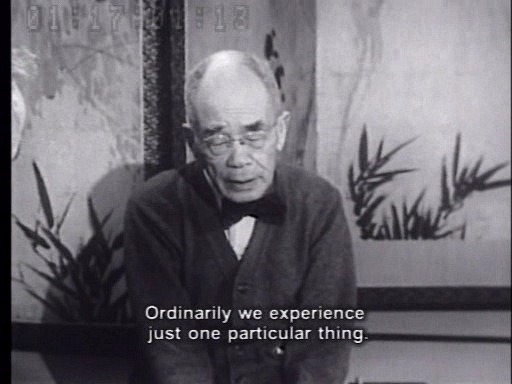
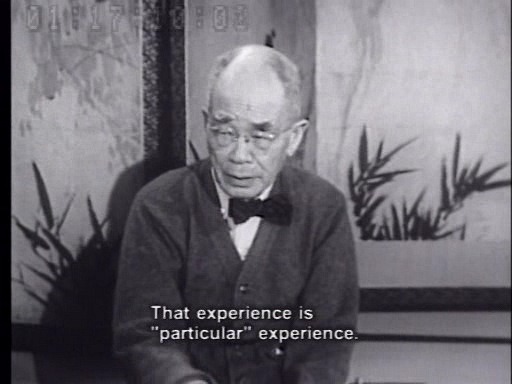




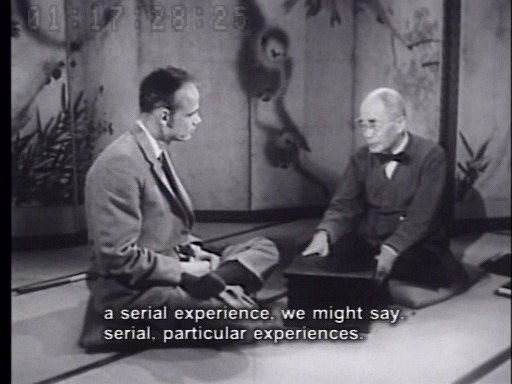
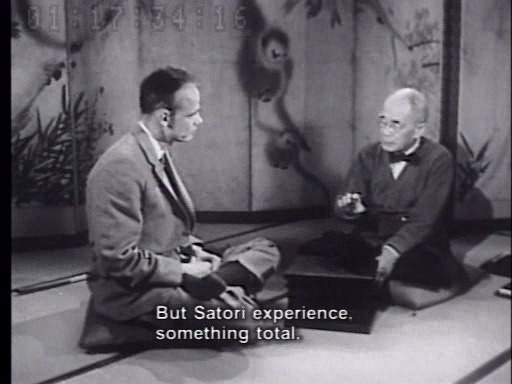
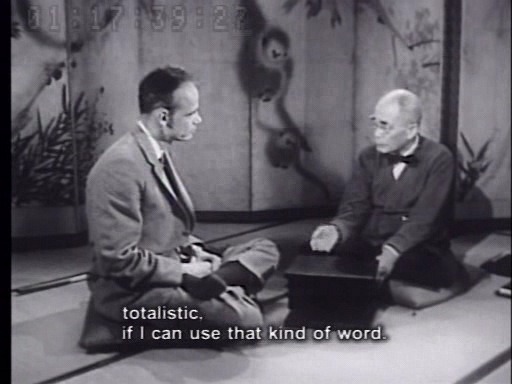
#A Zen Life: D.T. Suzuki#satori#zen#zen buddhism#buddhism#Daisetsu Teitaro Suzuki#D. T. Suzuki#japan#2006#Michael Goldberg
7 notes
·
View notes
Text

“The idea of Zen is to catch life as it flows. There is nothing extraordinary or mysterious about Zen. I raise my hand; I take a book from the other side of the desk; I hear the boys playing ball outside my window; I see the clouds blown away beyond the neighboring wood — in all these I am practicing Zen, I am living Zen. No wordy discussion is necessary, nor any explanation… When the sun rises the whole world dances with joy and everybody’s heart is filled with bliss. If Zen is at all conceivable, it must be taken hold of here.”
D.T. Suzuki
66 notes
·
View notes
Quote
The idea of Zen is to catch life as it flows. There is nothing extraordinary or mysterious about Zen. I raise my hand; I take a book from the other side of the desk; I hear the boys playing ball outside my window; I see the clouds blown away beyond the neighboring wood — in all these I am practicing Zen, I am living Zen. No wordy discussion is necessary, nor any explanation… When the sun rises the whole world dances with joy and everybody’s heart is filled with bliss. If Zen is at all conceivable, it must be taken hold of here.
D.T. Suzuki
17 notes
·
View notes
Text
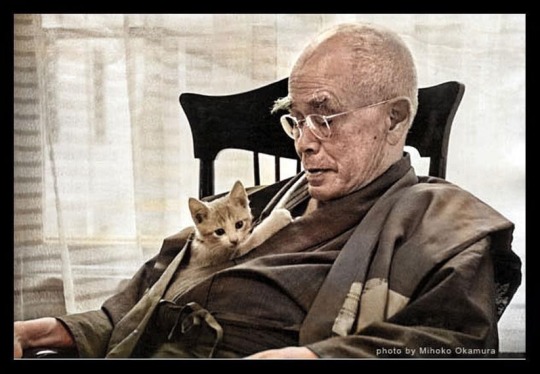
"The truth of Zen, just a little bit of it, is what turns one's humdrum life, a life of monotonous, uninspiring commonplaceness, into one of art, full of genuine inner creativity." ~ D.T. Suzuki
4 notes
·
View notes
Text
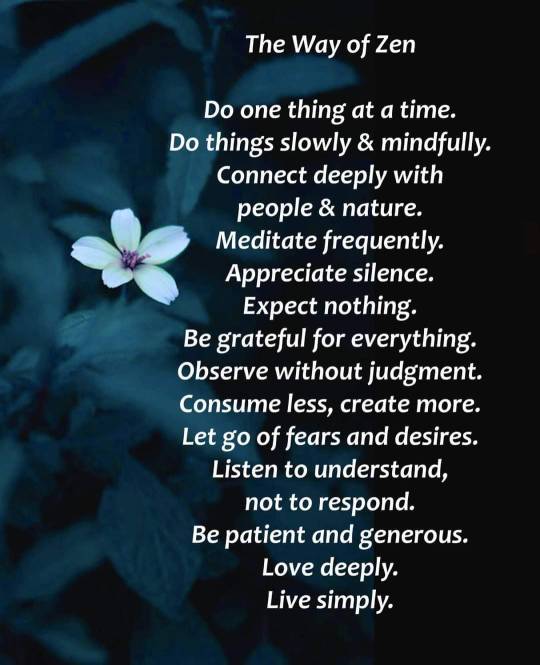
“The idea of Zen is to catch life as it flows. There is nothing extraordinary or mysterious about Zen. I raise my hand; I take a book from the other side of the desk; I hear the boys playing ball outside my window; I see the clouds blown away beyond the neighboring wood — in all these I am practicing Zen, I am living Zen. No wordy discussion is necessary, nor any explanation… When the sun rises the whole world dances with joy and everybody’s heart is filled with bliss. If Zen is at all conceivable, it must be taken hold of here.” ~ D.T. Suzuki
Zen & the Art of Living Deeply
https://creativesystemsthinking.wordpress.com/2016/05/15/zen-the-art-of-living-deeply
Zen Taoism Buddhism Tick Nhat Hanh Dalai Lama
15 notes
·
View notes
Text
The idea of Zen is to catch life as it flows. There is nothing extraordinary or mysterious about Zen. I raise my hand ; I take a book from the other side of the desk ; I hear the boys playing ball outside my window; I see the clouds blown away beyond the neighbouring wood: — in all these I am practising Zen, I am living Zen. No wordy discussions is necessary, nor any explanation. I do not know why — and there is no need of explaining, but when the sun rises the whole world dances with joy and everybody’s heart is filled with bliss. If Zen is at all conceivable, it must be taken hold of here.
D.T. Suzuki
1 note
·
View note
Text
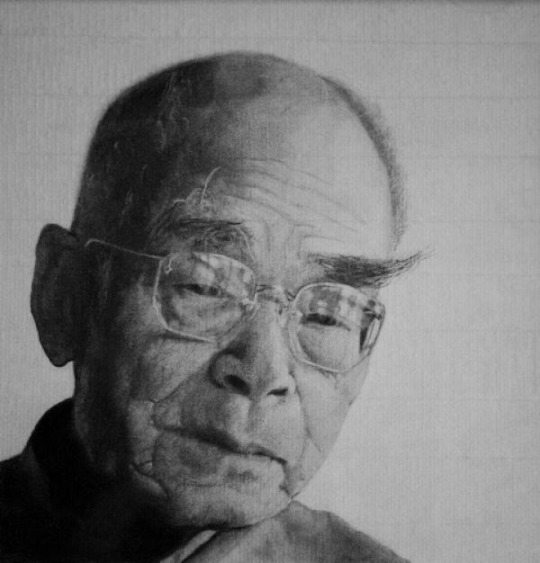
“The idea of Zen is to catch life as it flows. There is nothing extraordinary or mysterious about Zen. I raise my hand; I take a book from the other side of the desk; I hear the boys playing ball outside my window; I see the clouds blown away beyond the neighboring wood — in all these I am practicing Zen, I am living Zen. No wordy discussion is necessary, nor any explanation… When the sun rises the whole world dances with joy and everybody’s heart is filled with bliss. If Zen is at all conceivable, it must be taken hold of here.”
D.T. Suzuki
0 notes
Quote
In logic there is a trace of effort and pain; logic is self-conscious. So is ethics, which is the application of logic to the facts of life. An ethical man performs acts of service which are praiseworthy, but he is all the time conscious of them, and, moreover he may often be thinking of some future reward. Hence we should say that his mind is tainted and not at all pure, however objectively or socially good his deeds are. Zen abhors this. Life is an art, and like perfect art it should be self-forgetting; there ought not to be any trace of effort or painful feeling. Life, according to Zen, ought to be lived as a bird flies through the air or as a fish swims in the water. As soon as there are signs of elaboration, a man is doomed, he is no more a free being. You are not living as you ought to live, you are suffering under the tyranny of circumstances; you are feeling a constraint of some sort, and you lose your independence. Zen aims at preserving your vitality, your native freedom, and above all the complete-ness of your being. In other words, Zen wants to live from within. Not to be bound by rules, but to be creating one's own rules -- this is the kind of life which Zen is trying to have us live. Hence its illogical, or rather superlogical, statements.
D.T. Suzuki (”Illogical Zen”, An Introduction to Zen Buddhism)
#d.t. suzuki#illogical zen#an introduction to zen buddhism#zen buddhism#books im reading#quarantine reads
18 notes
·
View notes
Text
Zen Teachings on Fear
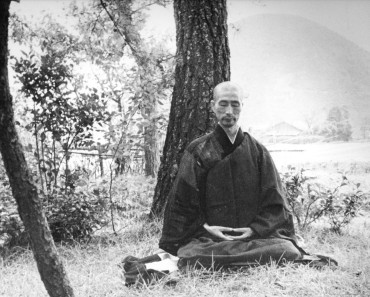
If the ego had an engine, its fuel would be fear. Trepidation isn’t all bad, but it certainly has its time and place. Fear can render us quivering and useless, or motivate us toward change. In the study of Zen, we learn how to not only overcome our fears, but to become fearless. This is called the Lion’s Roar of Zazen.
The lion is the living embodiment of self-possessed power. This animal has dominion over all he sees as well as the courage, speed, and might to attain all he desires. His deportment is regal and calm, though, never bullying and neither shrinking.
The metaphor of the lion is used to describe how one overcomes fear in the Majjhima Nikaya, a Collection of Middle Length Discourses on Buddha’s teachings, and they
are immaculate at describing the fears most of us face. Many Zen teachers describe how to become regal and fearless in their discourses as well.
Fear of the Loss of Life
Zen master, D.T. Suzuki says that fear of the loss of body is usually what we must overcome first.
Following this, an internal consciousness becomes aware that we are threatening the slated, well-accepted notion of being merely corporeal, and we ‘think’ we are frightened.
Suzuki says we needn’t look any further than the bodily sensations that arise when we simply ponder fearfulness. An empty feeling in the lower abdomen ensues, there is an immobility at the base of the tongue, and our breathing becomes restricted. If we were to remove these sensations, though, fear becomes a meaningless thing.
Suzuki attests that according to Zazen, we aim to keep a lower abdomen full of power, the breathing always uniform, the heart beat tranquil, and the muscles of the whole body resilient so that if emotions like fear arise, they can easily be encountered and dismissed.
Fear of the Loss of ‘Self’
Some fear is understandable, even – such as when we realize we must face a spiritual death in order to progress on our path. Although we may long to richer higher levels of consciousness, we aren’t always so keen to let go of the habits and crutches that have propped up our current level of awareness. As the Sufi poet Rumi once said, “No one will find his way to the Court of Magnificence until he is annihilated.”
Other types of fear make us meek and fallible. Our consciousness easily wavers, and we cannot attain Mu, or a state of Zen, let alone get on with our daily activities. It is only by cultivating the 4 Zen States of Mind that we can ‘fill our abdomens’ with power and roar like a lion with fearlessness.
4 Zen States of Mind
Shoshin or “Beginner’s Mind” (初心) is the first stage in cultivating fearlessness. Think of a time when you were excited, and eager to start a new endeavor. There might have been unknowns, but you were brimming with glee over trying something new. This is the type of mind we want to cultivate with all aspects of life. Instead of begin nervous or fearful, we can aim to be eager and open, accepting all that comes our way. In order to approach life from the beginner’s mind we need to let of preconceived notions, and be optimistic. If you’ve been able to have this feeling with one thing you’ve done in life, you can translate that feeling to other areas also.
Fudoushin (不動心) means you have an “Immovable Mind.” It doesn’t mean you are stubborn, but fudoushin does translate to being determined in the face of obstacles. Does a lion run away from present danger? Hardly. The animal doesn’t get angry or judgmental about obstacles either. He is peaceful like the eye of the storm until he is upon his prey. If you can develop fudoushin when you are under stress, you will be unstoppable in life.
Mushin (無心) or “Without Mind.” This is a similar philosophy to the Chinese Taoist idea of wei wuwei. When we are ‘in the zone’ working on a great masterpiece or doing something we love, we’ve likely already experienced the state of mushin. When we are empty of thoughts, yet moving and acting purely in the present moment, without fear, anger, ego, or other emotion, we are a force to be reckoned with. By developing equanimity and learning how to focus to the point of no-thought, we can cultivate mushin.
The last of the four states of Zen Mind is called Zanshin (残心) which literally translates to “Remaining Mind.” This state of mind contains two precise elements. It means you are both relaxed and keenly aware of your surroundings. This is the state that marital artists aim to be in so that they can react at any moment to anything that comes their way. By maintaining relaxed alertness fear cannot sway you, even in the face of a frightening opponent.
Fear of Suffering
The Buddha taught that self-grasping and ignorance are the root of all remaining fears. Healthy fears aside, our tendency to try to avoid suffering – the fear of failure, heartbreak, being trapped, being lost, etc. are all caused by a single root – and arise from the mind. In Shantideva’s Guide to the Bodhisattva Way of Life, is is said that the Buddha articulated, “The source of all our fear comes from our own uncontrolled minds or “delusions.””
In order to overcome this root cause of fear, the Buddha, and Zen masters alike, teach to strive for no-self or emptiness. This doesn’t mean a nihilistic view for life is adopted. Friedrich Nietzsche accused Buddhism of being existentialist, but the Buddha taught us to seek the Middle Way between the mundane and the spiritual, seeing objects as real but dependently originated, not-self and unsatisfactory. Instead of seeing all things as pointless and empty, we see mundane life as meaningless but recognize spiritual goals as meaningful.
As the Zen master, Sojo has said, “Heaven and earth and I are of the same root, the ten-thousand things and I are of one substance.”
After all, even once the Buddha gave up all his worldly possessions he realized he was no closer to achieving Nirvana. He discovered that exaggerated asceticism was not required to attain enlightenment.
By learning how to work through these fears, we can achieve the ‘lion’s roar’ of full realization.
184 notes
·
View notes
Text
"The language used by Zen is therefore in some sense an anti-language, and the 'logic' of Zen is a radical reversal of philosophical logic. The human dilemma of communication is that we cannot communicate ordinarily without words and signs, but even ordinary experience tends to be falsified by our habits of verbalization and rationalization. The convenient tools of language enable us to decide beforehand what we think things mean, and tempt us all too easily to see things only in a way that fits our logical preconceptions and our verbal formulas.
Instead of seeing things and facts as they are we see them as reflections and verifications of the sentences we have previously made up in our minds. We quickly forget how to simply see things and substitute our words and our formulas for the things themselves, manipulating facts so that we see only what conveniently fits our prejudices.
Zen uses language against itself to blast out these preconceptions and to destroy the specious 'reality' in our minds so that we can see directly. Zen is saying, as Wittgenstein said, 'Don't think: Look!'
Since the Zen intuition seeks to awaken a direct metaphysical consciousness beyond the empirical, reflecting, knowing, willing and talking ego, this awareness must be immediately present to itself and not mediated by either conceptual or reflexive or imaginative knowledge. And yet far from being mere negation, Zen is also entirely positive.
Let us hear D.T. Suzuki on the subject:
'Zen always aims at grasping the central fact of life, which can never be brought to the dissecting table of the intellect. To grasp the central fact of life, Zen is forced to propose a series of negations. Mere negation however is not the spirit of Zen..." (Hence, he says, the Zen Masters neither affirm or negate, they simply act or speak in such a way that the action or speech itself is a plain fact bursting with Zen).
Suzuki continues:
'When the spirit of Zen is grasped in its purity, it will be seen what a real thing that (act — in this case a slap) is. For here is no negation, no affirmation, but a plain fact, a pure experience, the very foundation of our being and thought. All the quietness and emptiness one might desire in the midst of most active meditation lies therein. Do not be carried away by anything outward or conventional. Zen must be seized with bare hands, with no gloves on.' (D.T. Suzuki, Introduction to Zen Buddhism, London. 1960, D. 51)
It is in this sense that 'Zen teaches nothing; it merely enables us to wake up and become aware. It does not teach, it points.' (Suzuki, Introduction, p. 38) The acts and gestures of a Zen Master are no more 'statements' than is the ringing of an alarm clock."
- Thomas Merton, from Zen and the Birds of Appetite
#thomas merton#quote#quotations#zen#metaphysics#direct experience#linguistics#communication#language#meditation#d.t. Suzuki#perspective#bias#ludwig wittgenstein
11 notes
·
View notes
Text
“Modern life seems to recede further and further away from nature, and closely connected with this fact we seem to be losing the feeling of reverence towards nature. It is probably inevitable when science and machinery, capitalism and materialism go hand in hand so far in a most remarkably successful manner. Mysticism, which is the life of religion in whatever sense we understand it, has come to be relegated altogether in the background. Without a certain amount of mysticism there is no appreciation for the feeling of reverence, and, along with it, for the spiritual significance of humility. Science and scientific technique have done a great deal for humanity; but as far as our spiritual welfare is concerned we have not made any advances over that attained by our forefathers. In fact we are suffering at present the worst kind of unrest all over the world.”
― D.T. Suzuki, The Training of the Zen Buddhist Monk
77 notes
·
View notes
Text
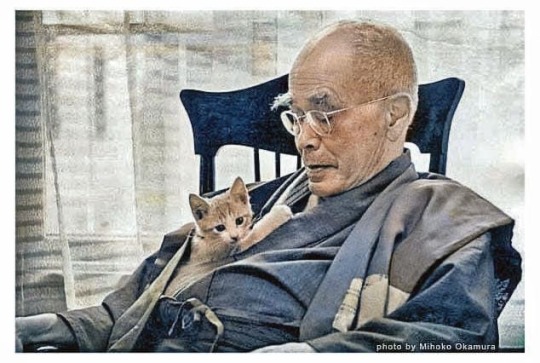
“The truth of Zen, just a little bit of it, is what turns one's humdrum life, a life of monotonous, uninspiring commonplaceness, into one of art, full of genuine inner creativity.”
D.T. Suzuki
40 notes
·
View notes
Text
‘The art of tea is most intimately connected with Zen not only in its practical development but principally in the observance of the spirit that runs through the ceremony itself. The spirit in terms of feeling consists of “harmony” (wa), “reverence” (kei), “purity” (sei), and “tranquility” (jaku). These four elements are needed to bring the art to a successful end; they are all the essential constituents of a brotherly and orderly life, which is no other than the life of the Zen monastery. [...]
‘The character for “harmony” also reads “gentleness of spirit” (yawaragi), and to my mind “gentleness of spirit” seems to describe better the spirit governing the whole procedure of the art of tea. Harmony refers more to form, while gentleness is suggestive of an inward feeling. The general atmosphere of the tearoom tends to create this kind of gentleness all around – gentleness of touch, gentleness of odor, gentleness of light, and gentleness of sound. You take up a teacup, handmade and irregularly shaped, the glaze probably not uniformly overlaid, but in spite of this primitiveness the little utensil has a peculiar charm of gentleness, quietness, and unobtrusiveness. The incense burning is never strong and stimulating, but gentle and pervading. The windows and screens are another source of gentle prevailing charm, for the light admitted into the room is always soft and restful and conducive to a meditative mood. The breeze passing through the needles of the old pine tree harmoniously blends with the sizzling of the iron kettle over the fire. The entire environment thus reflects the personality of the one who has created it.’
– D.T. Suzuki, ‘Zen and the art of tea / 1′, in Zen and Japanese Culture, pp.273-4
1 note
·
View note
Text
Mushin (mental state)
Mushin (mental state)
'Mushin' in Japanese and 'Wuxin' in Chinese (無心 "no mind") is a mental state. Zen and Daoist meditators are said to reach this state, as well as artists and trained martial artists. They also practice this mental state during everyday activities.
Mushin is achieved when a person's mind is free from thoughts of anger, fear, or ego during combat or everyday life. There is an absence of discursive thought and judgment, so the person is totally free to act and react towards an opponent without hesitation and without disturbance from such thoughts. At this point, a person relies not on what they think should be the next move, but what is their trained natural reaction (or instinct) or what is felt intuitively. It is not a state of relaxed, near-sleepfulness, however. The mind could be said to be working at a very high speed, but with no intention, plan or direction.
Some masters believe that mushin is the state where a person finally understands the uselessness of techniques and becomes truly free to move. In fact, those people will no longer even consider themselves as "fighters" but merely living beings moving through space.
The legendary Zen master Takuan Sōhō said:
The mind must always be in the state of 'flowing,' for when it stops anywhere that means the flow is interrupted and it is this interruption that is injurious to the well-being of the mind. In the case of the swordsman, it means death.
When the swordsman stands against his opponent, he is not to think of the opponent, nor of himself, nor of his enemy's sword movements. He just stands there with his sword which, forgetful of all technique, is ready only to follow the dictates of the subconscious. The man has effaced himself as the wielder of the sword. When he strikes, it is not the man but the sword in the hand of the man's subconscious that strikes.
The term contains the character for negation, "not" or "without" (無), along with the character for heart-mind (心). The term is shortened from mushin no shin (無心の心), a Zenexpression meaning the mind without mind and is also referred to as the state of "no-mindness". That is, a mind not fixed or occupied by thought or emotion and thus open to everything. It is translated by D.T. Suzuki as "being free from mind-attachment".
However, mushin is not just a state of mind that can be achieved during combat. Many martial artists train to achieve this state of mind during kata so that a flawless execution of moves is accomplished — that they may be achieved during combat or at any other time. Once mushin is attained through the practice or study of martial arts (although it can be accomplished through other arts or practices that refine the mind and body), the objective is to then attain this same level of complete awareness in other aspects of the practitioner's life.
5 notes
·
View notes
Photo

A museum with Zen architecture created in 2011 to commemorate the work and life of D.T. Suzuki, a Buddhist philosopher born in Kanazawa. He popularized Eastern Buddhism in the West. https://www.instagram.com/p/BsawHaUB8WY/
6 notes
·
View notes
Text
The truth of Zen, just a little bit of it, is what turns one's humdrum life, a life of monotonous, uninspiring commonplaceness, into one of art, full of genuine inner creativity.
D.T. Suzuki
0 notes